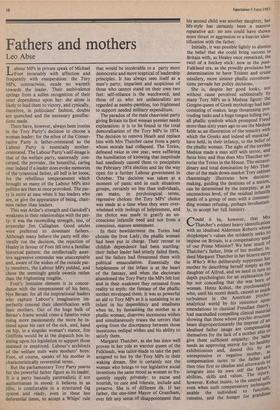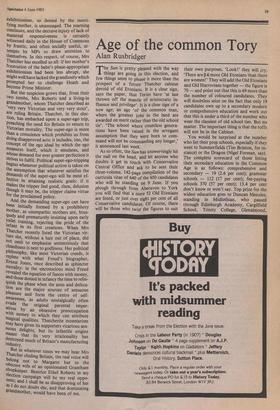Fathers and mothers
Leo Abse
Labour MPs in private speak of Michael Foot invariably with affection and frequently with exasperation: the Tory
MPs, contrariwise, exude no warmth towards the leader. Their ambivalence springs from a sullen recognition of their utter dependence upon her: she alone is likely to lead them to victory, and cynically, therefore, in politicians' fashion, doubts are quenched and the necessary genuflec- tions made.
There have, however, always been ironies in the Tory Party's decision to choose a woman leader: for the ethos of the Conser- vative Party is father-orientated as the Labour Party is essentially mother- orientated. The Labour Party's self-image is that of the welfare party, maternally con- cerned, the provider, the bountiful, caring one: indeed if a leader does evoke memories of the tyrannical father, all hell is let loose, for the rebellious temperaments which brought so many of the Labour MPs into politics are then at once provoked. The par- ty is more at ease when it has leaders who are, or give the appearance of being, chair- men rather than leaders.
This was Attlee's strength and Gaitskell's weakness in their relationships with the par- ty: it was the reconciling strength, too, of avuncular Jim Callaghan. Good uncles were preferred to dominant fathers. Although many believe the party will elec- torally rue the decision, the rejection of Healey in favour of Foot fell into a familiar historical pattern: the intellectually asser- tive aggressive contender was unacceptable and, aware of the wishes of the outside par- ty members, the Labour MPs yielded, and chose the seemingly gentle sweetie rather than the frightening toughie.
Foot's feminine element is in concor- dance with the temperament of his hero, Nye Bevan: for all the inspirational leaders who capture Labour's imagination im- perfectly conceal their identification with their mothers. Out of the huge bulk of Bevan's frame would come a falsetto voice rising more passionately the more he in- sisted upon his care of the sick, and, hand on hip, in a singular woman's stance, Jim Griffiths would be at the dispatch box in- sisting upon his legislation to support those maimed or employed. Labour's architects of the welfare state were mothers' boys: Foot, of course, speaks of his mother in characteristically reverential terms.
But the parliamentary Tory Party yearns for the powerful father figure as its leader. It is a party basically paternalistic if not authoritarian in mood: it believes in an elite, is comfortable in a structured fag system and ready, even in these less deferential times, to accept a Whips' rule that would be intolerable to a party more democratic and more sceptical of leadership principles. It has always seen itself as a man's party, impatient and suspicious of those who cannot stand on their own two feet: self-reliance is the watchword, and those of us who are unilateralists are regarded as namby-pambies, too frightened to support needed military expenditure.
The paradox of the male chauvinist party giving Britain its first woman premier needs explanation: it is to be found in the total demoralisation of the Tory MPs in 1974. The decision to remove Heath and replace him with Mrs Thatcher came from a party whose morale had collapsed. The Tories, defeated twice in one year, were suffering the humiliation of knowing that ineptitude had needlessly caused them to precipitate the February 1974 election and lay the way open for a further Labour government in October. The decision was taken at a moment of panic and in such situations groups, certainly no less than individuals, can make, in psychological terms, regressive choices: the Tory MPs' choice was made at a time when they were over- whelmed with feelings of helplessness, and the choice was made to gratify an un- conscious infantile need and not from a conscious, mature assessment.
In their bewilderment the Tories had chosen the Iron Lady, the phallic woman had been put in charge. Their retreat to childish dependence had been startling: their father leader had utterly failed them, and the failure had threatened them with political emasculation. Essentially the helplessness of the infant is at the heart of the fantasy, and when the electorate abandoned the Tory Party the MPs felt lost and in their weakness they retreated from reality to myth: the fantasy of the phallic mother enveloped them. It was as powerful an aid to Tory MPs as it is sustaining to an infant in his dependency and smallness when he, by fantasising the mother as a phallic woman, disavows incestuous wishes and simultaneously erases the terrors that spring from the discrepancy between those incestuous oedipal wishes and his ability to satisfy them.
Margaret Thatcher, as she has since well proven in her role as warrior queen of the Falklands, was tailor-made to take the part assigned to her by the Tory MPs in their waking dream. She is certainly not the woman who brings to our legislative social inventions the same mood as women so fre- quently supply privately: to nurse and nourish, to care and tolerate, include and preserve. She is of different ilk. If her father, the one-time Mayor of Grantham, ever felt any sense of disappointment that his second child was another daughter, her life-style has certainly been a massive reparative act: no son could have shown more thrust or aggression or a heavier iden- tification with the father.
Initially, it was possible lightly to dismiss the belief that she could bring success to Britain with, as Healey once remarked, the twirl of a hockey stick: now in the post- Falkland era, as she proudly proclaims her determination to have Trident and cruise missilery, more sinister phallic corrobora- tions pervade her policy decisions. She is, despite her good looks, not without cause perceived subliminally by many Tory MPs as a Medusa figure: the Gorgon queen of Greek mythology had hair consisting of snakes, large threatening pro- truding tusks and a huge tongue lolling out, all phallic symbols which prompted Freud more than sixty years ago to use the Medusa fable as an illustration of the tenacity with which the Greeks and indeed all mankind have held, in their infancy, to the belief of the phallic woman. The sight of the terrible
Medusa made a man stiff with terror, and fr-oze him; and thus does Mrs Thatcher ter-
rorise the Tories in the House. The extraor-
dinary and total domination by Mrs That- cher of the male down-market Tory cabinet
chasteningly illustrates how decision-
making, guiding the destinies of a nation, can be determined by the interplay, at an
unconscious level, of the residual infantile needs of a group of men with a comman- ding woman refusing, perhaps involuntari- ly, to accept her full feminity.
ould it be, however, that Mrs N.--,Thatcher's evident heavy identification with an idealised Alderman Roberts whose shopkeeper's values she stridently seeks to impose on Britain, is a compensatory need of our Prime Minister? We hear much _of Thatcher's father, little of her mother; in- deed Margaret Thatcher in her bizarre entry in Who's Who deliberately suppresses her mother by describing herself simply as the daughter of Alfred, and we need to turn to depth psychologists for an explanation for her not conceding that she was born of woman. Heinz Kohut, the psychoanalyst who, until his recent death, caused so much turbulence in the American psycho analytical world by his insistence upon emendations to classical Freudian theory, had marshalled compelling clinical material showing that those whose psychic structure bears disproportionately the impress of an idealised father image are compensating themselves for the lack of a mother able to give them sufficient empathy: the babe needs an approving mirror for his healthY exhibitionism and, denied this by an unresponsive or negative mother, as
.
compensation turns to the father and then tries first to idealise and afterwadecos t integrate into its own self the fa abilities, skills and values. The injurlyf, however, Kohut insists, to the central se s, even when such compensatory techni9ue enable the individual to functi.on remains, and the hunger for granchos
exhibitionism, so denied by the morti- fying mother, is unassuaged. The yearning continues, and the decisive injury of lack of maternal responsiveness is certainly witnessed daily in the House of Commons by frantic, and often socially useful, at- tempts by MPs to draw attention to themselves. In this respect, of course, Mrs Thatcher has excelled us all: if her mother's frustration of the babe's phase-appropriate exhibitionism had been less abrupt, she might well have lacked the grandiosity which prompted her to challenge Heath and become Prime Minister.
But the suspicion grows that, from their two tombs, Mrs Roberts and a living-in grandmother, whom Thatcher described as `very very Victorian and very very strict', are ruling Britain. Thatcher, in this elec- tion, has embarked upon a super-ego trip, preaching the need for Britain to return to Victorian morality. The super-ego is more than a conscience which prohibits us from doing disapproved acts: it includes, too, the concept of the ego ideal by which the ego measures itself, which it emulates, and whose demand for ever greater perfection it strives to fulfil. Political super-ego-tripping begins whenever political action is taken on the assumption that whatever satisfies the demands of the super-ego will be most ef- fective in attaining realistic goals: if it makes the tripper feel good, then, delusion though it may be, the tripper claims virtue for the proclaimed policy. And the demanding super-ego can have been initially formed by a prohibitory mother, as unempathic mothers are, brus- quely and prematurely insisting upon early toilet training, rejecting the pride of the Infant in its first creations. When Mrs Thatcher recently listed the Victorian vir- tues she, without a hair out of place, did not omit to emphasise sententiously that cleanliness is next to godliness. Her political philosophy, like most Victorian creeds, is replete with what Freud's biographer, Ernest Jones, once described as sphincter morality: in the unconscious mind Freud revealed the equation of faeces with money, and those denied in infancy the time to relin- quish the phase when the anus and defeca- tion are the major sources of sensuous pleasure and form the centre of self- awareness, as adults nostalgically often evade the original parental imper- atives by an obsessive preoccupation with money to which they can attribute magical qualities. Thatcherite monetarism
may have given its supporters vicarious sen- suous delights, but its infantile origins meant that its very irrationality has d. estroyed much of Britain's manufacturing industry.
But in whatever tones we may hear Mrs Thatcher chiding Britain, the real voice will belong not to Margaret but to the obscure wife of an opinionated Grantham shopkeeper. Beatrice Ethel Roberts in my election campaign will be my real oppo- nent; and I shall be as disapproving of her as I do not doubt she, and that dominating grandmother, would have been of me.















































 Previous page
Previous page